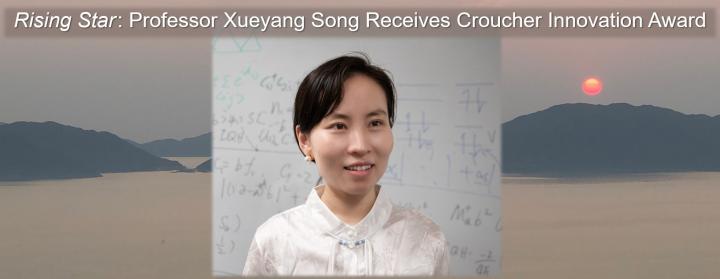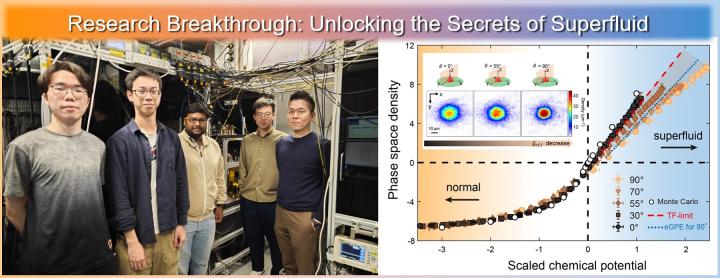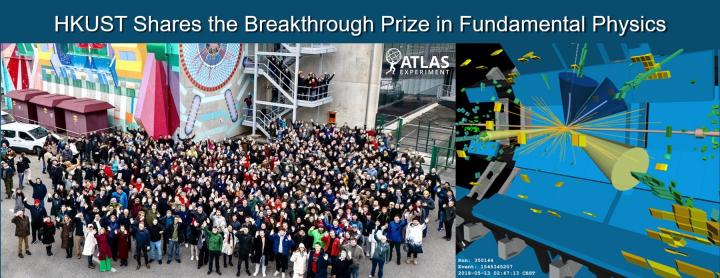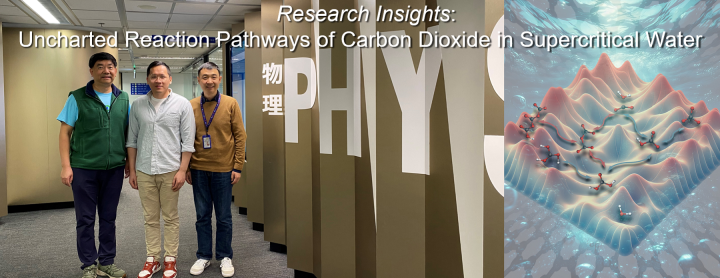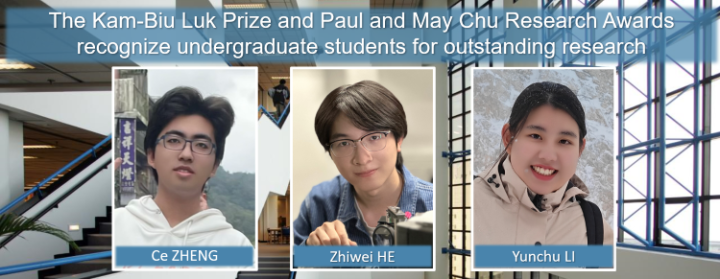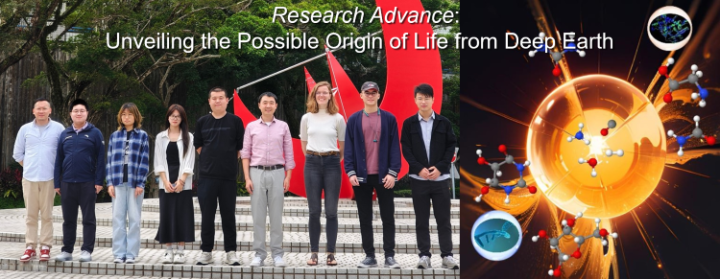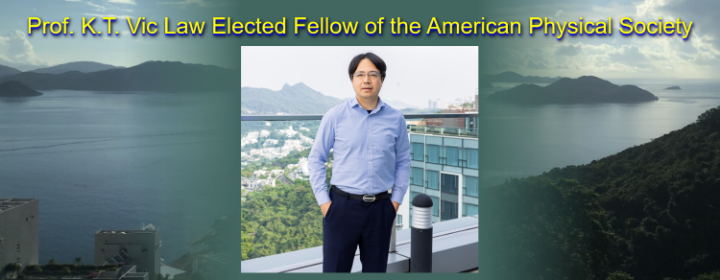News & Events
2025-06-02
Congratulations to Assistant Professor Xueyang Song for being awarded the prestigious 2025 Croucher Tak Wah Mak Innovation Award 2025 by the Croucher Foundation in recognition of her groundbreaking research in theoretical condensed matter physics.
Established in 2012, the Croucher Innovation Awards aim to identify and provide substantial support to a small number of exceptionally talented “rising stars” in science and engineering disciplines at a formative stage of their careers. Recipients are selected or their distinguished doctoral and post-doctoral work, internationally competitive research achievements, and high-impact contributions to their field.
Prof. Song's research focuses on "decoding" quantum materials – substances with bizarre properties like superconductivity and the ability to make particles behave as fractions of themselves. Specializing in quantum materials like frustrated quantum magnets, fractional quantum Hall states, and exotic superconductors, Prof. Song investigates emergent phenomena such as fractionalization and gauge structures. Her research employs cutting-edge frameworks of symmetry, anomaly, and topology to decode physical properties and phase transitions in advanced materials, particularly in 2D systems (e.g., Moiré system). By combining formal theoretical tools, analytical models with computational simulations, she bridges fundamental physics with real-world applications, including energy-efficient materials and novel devices.
Prof. Song joined HKUST as an Assistant Professor of Physics in 2023. Her passion for physics emerged during high school, where she competed in the 14th Asian Physics Olympiad (APhO) and earned a gold medal. She pursued her undergraduate studies at Peking University, graduating with a Bachelor of Science degree, before advancing to Harvard University for her PhD in physics. Prior to joining HKUST as a faculty member, Prof. Song honed her research skills as a Moore postdoctoral fellow at the Massachusetts Institute of Technology (MIT).
Press Releases:
HKUST: Croucher Innovation Award 2025
Croucher Foundation: Innovation Awards 2025
Read more
2025-06-02
PLANCKS “Physics League Across Numerous Countries for Kick-Ass Students” is an annual international theoretical physics competition for undergraduate and master’s students that is overseen by the International Association of Physics Students (IAPS). This competition brings together teams of three to four students during a three-day conference for intense competition and a programme of social, cultural, and educational events.
Following their selection to represent Hong Kong by excelling in a preliminary round of competition organized by the Physical Society of Hong Kong, a team of undergraduate students studying physics (PHYS) and electrical and computer engineering (ECE) at HKUST participated in the international finals of the PLANCKS competition that was hosted by the Institute of Physics at Physics Faculty of the Autonomous University of Barcelona, Spain on 1-5 May 2025. The members of the team, who named themselves “Technician Association at Clear Water Bay”, were Hengjian LI (PHYS, year 4), Yifan LIU (ECE, year 4), Yuchen QIAN (PHYS, year 2), and Mingrui ZHOU (PHYS, year 2). The Technician Association at Clear Water Bay proudly reached the podium by placing 3rd among 46 seasoned teams from 29 countries and regions in Europe, Asia, Africa, North America that participated in PLANCKS this year. The four-day program also included a rich program of presentations by global leaders in science and industry and laboratory, tech start-up, campus, and city sightseeing tours.
The accompanying photos show the (left) the PLANCKS organizers and participants and (right) the HKUST team comprised the team (left to right): Mingrui Zhou, Yuchen Qian, Hengjian Li, and Yifan Liu.
Read more
2025-05-08
Research team members from the Department of Physics, HKUST (from left to right): Mr. Xingkai Cheng (PhD candidate) and Prof. Junwei Liu
Press Releases:
University
New Era of Magnetization: HKUST Research Sheds Light on Future Applications in Spintronics and Valleytronics
磁學新時代:科大最新研究為自旋電子學和谷電子學應用帶來新方向
School of Science
New Era of Magnetization: HKUST Research Sheds Light on Future Applications in Spintronics and Valleytronics
磁學新時代:科大最新研究為自旋電子學和谷電子學應用帶來新方向
EurekAlert
New era of magnetization: HKUST research sheds light on future applications in spintronics and valleytronics | EurekAlert!
Other University Social media
Facebook: https://www.facebook.com/hkust/posts/pfbid0yhm3TFM5hMZrMxSjY4Gxq3BvNCB2SRphLc4nGiVNw8Fi8fL8HFwx6Hn5R5Lzh9xzl
LinkedIn: https://www.linkedin.com/feed/update/urn:li:activity:7322553193123434496
X: https://x.com/hkust/status/1916787537252876479
Weibo: https://weibo.com/7727144419/PpmNWbH8Q
Zhihu: https://zhuanlan.zhihu.com/p/1900237602461820112
WeChat: https://mp.weixin.qq.com/s/hemLw
Read more
2025-05-08
Photo taken by Xueyang Song
The Department of Physics is proud to welcome two new faculty members (l-r):
Assistant Professor Kaifei Kang graduated with a B.S. in physics from Xi'an Jiaotong University in 2016 and completed his Ph.D. at Cornell University in 2022. He then spent two years as a postdoctoral scholar at Cornell before joining the faculty at HKUST. His research focuses on electronic properties of two-dimensional quantum materials and quantum devices, with a broad interest in topological physics, strongly correlated physics, superconductivity, spintronics, and related areas. His work aims to uncover new quantum states of matter and advance experimental techniques in the field. https://physics.hkust.edu.hk/people/kaifei-kang-kangkaifei
Assistant Professor Jue Wang received his B.S. from Peking University in 2014, and his Ph.D. from Columbia University in 2020, advised by Professor Xiaoyang Zhu. Prior to joining HKUST, he was a Harvard Quantum Initiative Postdoctoral Fellow at Harvard University, co-advised by Professor Philip Kim and Professor Hongkun Park. As an experimental condensed matter physicist working on low-dimensional materials and strongly correlated phenomena, he aims to realize novel quantum matters, deepen our understanding of them, and unlock their potential in the ongoing quantum revolution. To achieve these goals, his group develops and applies a variety of optical spectroscopies and techniques, especially those using ultrafast lasers, together with nanofabrication of electronic devices, electrical measurements, and low-temperature techniques capable of cooling electrons down to the 10 mK range. https://physics.hkust.edu.hk/people/jue-wang-wangjue
Read more
2025-04-30
Research team members (from left to right): Mr. Xinpeng Chen, Mr. Haoting Zhen, Mr. Mithilesh Parit, Mr. Yifei He, Prof. Gyu-Boong Jo of the Department of Physics, HKUST
University Press Releases:
Unlocking the Secrets of Superfluid: HKUST Scientists Unveil How Dipolar Interactions Shape Two-Dimensional Superfluid Behavior
揭秘超流體:科大研究揭示偶極相互作用如何影響二維超流體行為
Eurekalert!
Read more
2025-01-28
Research team members (from left to right): Professor Yuan Yao (HKUST Department of Mathematics), Research Assistant Professor Chu Li (HKUST Department of Physics), Professor Ding Pan (HKUST Department of Physics)
University press releases:
HKUST Researcher Unveiling the Uncharted Reaction Pathways of Carbon Dioxide in Supercritical Water
科大研究揭示超臨界水中二氧化碳不為人知的反應路徑
科大研究揭示超临界水中二氧化碳不为人知的反应路径
Read more
2024-12-12
The Department of Physics is pleased to announce the winners of the 2024 Luk Kam-Biu Prize for Undergraduate Research and the 2024 Paul and May Chu Undergraduate Research Awards. The Luk Kam-Biu Prize is awarded to Zhiwei HE. The Paul and May Chu Undergraduate Research Award is awarded to Ce ZHANG, and Honorable Mention is awarded to Yunchu LI.
Kam-Biu Luk Prize - Zhiwei HE
“For advancements that facilitate comparisons of nonlinear behaviors across various integrated photonic platforms and provide strategies to mitigate parasitic effects,” under the supervision of Dr. Wil Kao (École Polytechnique Fédérale de Lausanne).
Zhiwei He made significant contributions to the microwave-optical transduction efforts at the Laboratory of Photonics and Quantum Measurements at École Polytechnique Fédérale de Lausanne (EPFL) during his research exchange visit in the summer of 2024. In this project, he independently designed and constructed a laser frequency stabilization setup using the Pound-Drever-Hall (PDH) technique. With the functional PDH setup established, Zhiwei HE developed experimental methodologies for characterizing photorefractive effects in a range of ferroelectric materials. The methodologies he created are broadly applicable, extending beyond this specific project, and will facilitate systematic comparisons of nonlinear behaviors across various integrated photonic platforms. Mr. He’s research exchange visit to EPFL was facilitated by the International Research Enrichment Program of the School of Science. Mr. He was also the Paul and May Chu Undergraduate Research Award Honorable Mention recipient in 2023.
Paul and May Chu Undergraduate Research Award - Ce ZHENG
“For the growth of high quality MoTe2 with an improved method and for the construction of a new 2D transfer stage system,” under the supervision of Prof. Shiming Lei.
Ce Zheng was one of the first students to actively participate in the foundational phase of Prof. Shiming Lei’s lab development. During the Fall 2023 semester, he worked diligently alongside two other lab members to construct a home-built vacuum line, successfully testing its performance by growing initial testbed materials. Additionally, Ce Zheng contributed to the design and construction of a fully motorized 2D material transfer stage using components sourced from Taobao.com. To facilitate ease of operation, he also contributed to the development of a MATLAB GUI package that enables high-precision fabrication of 2D devices.
Paul and May Chu Undergraduate Research Award, Honorable Mention - Yunchu LI
“For the development of a low temperature diode laser system in a vacuum,” under the supervision of Prof. Gyu-Boong Jo.
Since joining Prof. Gyu-Boong Jo’s group, Yunchu Li has worked on various experimental projects in the ytterbium quantum gas experiment, including controlling a spatial light modulator and designing a direct digital synthesis system. More recently, Yunchu LI initiated a new research project to develop a home-built external cavity diode laser (ECDL) that can operate at temperatures below 0°C. This innovative approach allows the ECDL to function without concerns about laboratory humidity. Yunchu LI is currently summarizing this work into a manuscript that will be submitted for publication in due course. Read more
2024-12-09
Research team members (from left to right): Dr. Chu Li, Chen Chen, Yangyang Zhang, Jiajia Huang, Yaowen Zhang, Prof. Ding Pan, Dr. Nore Stolte, Lik Hang Alpha Hui, Dr. Tao Li
University press releases:
HKUST Research Unveiling the Possible Origin of Life from Deep Earth
科大研究揭示地球深部可能的生命起源
HKUST Science: Unveiling the Possible Origin of Life from Deep Earth
Read more
